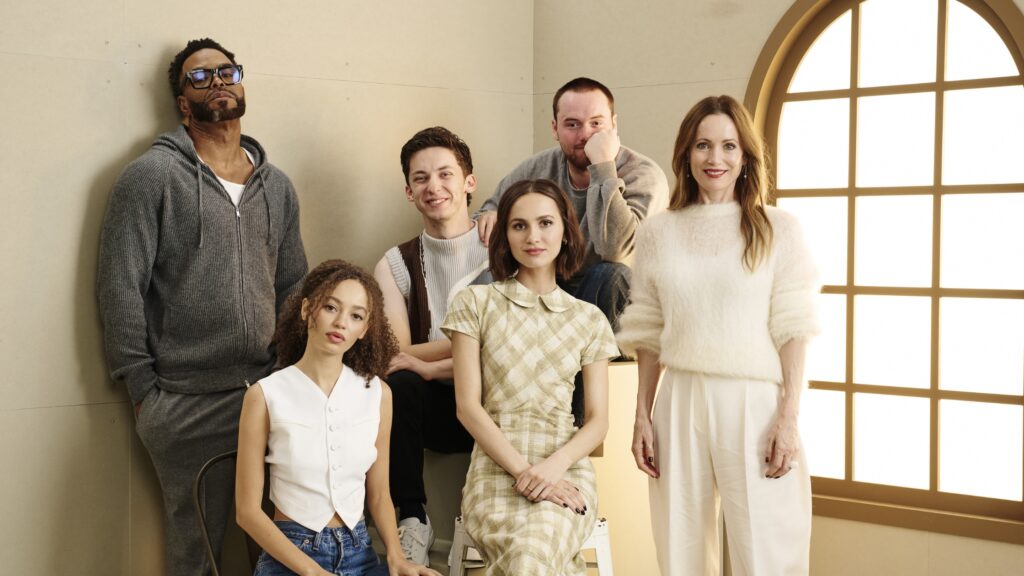Introduction.
Poetic License is the feature directorial debut of Maude Apatow, written by Raffi Donatich and produced by Apatow’s production outfit alongside others. The film premiered at the Toronto International Film Festival in September 2025, in the “Special Presentations” section, and is scheduled for theatrical release in 2026.
It is a subtle, character-driven comedy-drama (“dramedy”) about friendship, life transitions, envy, mentorship and creative expression — all set in the somewhat contained world of a university poetry class and the people around it.
Cast and characters.
How many cast?
The core credited cast includes the following principal actors:
- Leslie Mann as Liz Cassidy
- Andrew Barth Feldman as Sam Solomon
- Cooper Hoffman as Ari Zimmer
- Nico Parker as Dora Cassidy, Liz’s daughter
- Maisy Stella as Grace Wilson
- Method Man (Cliff “Method Man” Smith) as James Cassidy
- Martha Kelly as Professor Greta Ellis
- Jake Bongiovi as Julian Bende
- Plus several others (Will Price as Max, Sam Snyder, and the full cast credited on IMDb includes a broader ensemble of supporting roles).
If you include all credited cast (principals + supporting + smaller roles) the number runs into dozens (the full credits list on IMDb shows many names).
Who is the “main character”?
While the story is somewhat ensemble-driven, the central character can fairly be taken as Liz Cassidy (Leslie Mann). Liz is the emotional pivot: a former therapist, now in a transitional life phase, who audits a college poetry class and becomes entangled (directly and indirectly) in the lives of two college seniors, Sam and Ari. The plot is triggered by her arrival in the university town, her attempt to find meaning and connection, and how her presence influences Sam and Ari’s friendship and ambitions.
Simultaneously, Sam and Ari are major players: their friendship, competition, identity crises and creative ambitions form a large part of the film’s dramatic engine. So, one could say the film has three “lead” characters (Liz, Sam, Ari) but Liz is arguably the main lens through which the themes of change, mentorship and self-rediscovery are explored.
Box office and financials.
When it comes to “box collection” (i.e., box office earnings), here’s what is publicly available:
- According to The Numbers, for Poetic License (2026 wide release) the domestic box office number is listed as n/a (not yet reported) as of the latest update.
- According to Deadline, the North American theatrical distribution rights were purchased by Row K Entertainment in a mid-seven-figure deal (estimated in the $5.5 million-$7 million range) at TIFF 2025.
Thus: the film has secured a strong distribution deal, but publicly reported box-office gross numbers are not yet available (or at least not well‐published). It’s still early in its theatrical window.
In summary: we do not yet have a definitive “box collection” figure; we only know that the rights acquisition suggests commercial confidence.
Niche / genre / target audience.
What niche does this film occupy?
Poetic License can be described as a character-driven dramedy with strong elements of coming-of-age (though inclusive of mid-life transition) and generational interchange. Its niche features include:
- A depiction of college life, but from the perspective not only of the students, but of an adult who enters their world (Liz auditing the poetry class).
- Themes of creative expression (poetry class setting) rather than purely romantic or action-driven plot.
- A tone that is both humorous and sincere — looking at identity, friendship, mentorship, ambition, and change.
- A Poetic License film that will appeal to young adults / university students (for Sam & Ari’s world), as well as middle‐aged viewers who may identify with Liz’s sense of reorientation.
- An indie-comedy feel, but produced and distributed with mainstream support (Apatow Productions, etc) — so it straddles festival film and accessible theatrical comedy.
Who is this film for?
- Audiences who enjoy subtle comedies that assemble relatable characters rather than large spectacle.
- Viewers in the 20s to 30s age-bracket (college, just out of college) as well as viewers in their 40s-50s dealing with life transitions.
- People interested in films about creative lives, mentorship, friendships, generational dynamics, and the tension between youthful ambition and adult reflection.
- Fans of ensemble comedies with warmth rather than cynicism, and films that explore “what happens after the big choices” rather than the big dramatic choice itself.
How is it different / what makes it special?
- Rather than focusing purely on students or purely on a middle-aged protagonist, the film bridges those worlds: a student + adult narrative.
- The setting of a poetry class is unusual and modest; it gives the film a contemplative bent not always found in college comedies.
- The director, Maude Apatow, is making her debut and brings a voice that straddles independent sensibility with comedic tradition (her family background in comedy is present, but reviewers say she has her own voice).

Deep Dive: Story, Themes & Execution.
Story outline (without major spoilers)
Liz Cassidy (Leslie Mann) and her partner James Cassidy (Method Man) move to a university town after James lands a teaching job in the economics department. Liz, formerly a therapist in Chicago, finds herself with more idle time, fewer familiar friends, and a sense of dislocation. Her daughter, Dora (Nico Parker), is finishing high school and trying to find her place in this new town.
At the same time, two inseparable college seniors, Sam Solomon (Andrew Barth Feldman) and Ari Zimmer (Cooper Hoffman), are navigating their final year of undergraduate life. Sam is ambitious, hardworking, preparing for a high-financial career. Ari comes from wealth, lives off-campus in a luxurious apartment, and is more aimless (or at least less sure of his future). The two share everything: classes, living space, ambitions, insecurities.
Liz signs up (as an auditor) for the university’s poetry writing workshop taught by Professor Greta Ellis (Martha Kelly). Sam and Ari are participants. As Liz begins attending, the two young men are intrigued by her — both her perspective and her life experience. A friendship evolves: late-night hangouts, esoteric poetry readings, drinks, hallucinogens (the film handles but doesn’t sensationalize this), and the conversion of the student-mentor dynamic into something more ambiguous.
What begins as friendship gradually reveals unspoken rivalries: Sam and Ari’s friendship starts to strain as each reacts to Liz’s presence differently. Liz in turn is forced to confront her new identity: empty-nest, re-locating, wondering about her role and her voice in this younger world. Dora, meanwhile, watches from the side, suspicious of her mother’s new friendships and the shifting dynamic.
The film’s climax revolves around the collision of ambitions, friendship faults, and emotional truths emerging via the poetry class, personal vulnerabilities, jealousy, and miscommunication. It leaves the viewer with a sense of unresolved but hopeful possibility, rather than neatly tied up endings.
Themes and commentary
1. Friendship, competition & identity
The core dynamic between Sam and Ari is central: they’ve been best friends, intertwined in all ways, but the arrival of Liz introduces a fissure. The film uses this to explore how friendships can change when a third person enters, how competition for emotional attention can undermine long-standing bonds, and how young men define themselves (or fail to) when their relationship to each other is destabilized.
2. Mentorship, admiration & boundaries
Liz occupies a semi-mentor role (former therapist, adult life experience), but the film complicates this: Sam and Ari both admire (and are attracted to) her, in different ways. The question of what it means to be “seen” by someone older, how admiration turns into something more charged, how boundaries blur — these are quietly explored. The film asks: can an adult in a younger world maintain healthy boundaries, and what happens when that’s tested?
3. Ambition, creative self-expression & fear
The poetry class setting is more than just a backdrop: it stands for creative risk, emotional expression, vulnerability, voice. Sam wants stability and financial success; Ari is more adrift; both are nearing a transition out of college. Liz has left her prior profession and is re-evaluating her identity. The Poetic License film suggests that creative expression is messy, non-linear, and that life transitions don’t come with neat scripts.
4. Generational synergy and mis-understanding
Often films depict students and adults as completely different worlds — not so here. Liz, Sam and Ari are drawn together, and yet miscommunication abounds. The Poetic License film highlights how younger people and older people can try to connect meaningfully, yet misunderstandings happen. It posits empathy but avoids idealizing the process. It treats both sides with respect rather than caricature.
5. Feminine self-discovery in mid-life
Liz’s story is a secondary coming-of-age: empty-nester, moving to a new town, former therapist giving up a practice, unsure of her next step. The film acknowledges that reinvention is not just for the young, and that starting over (or re-starting) at mid-life can be disorienting and quietly heroic. The narrative gives Leslie Mann’s character real weight, not just as a foil for younger characters.
Execution: direction, performances, tone
- Direction: Maude Apatow’s debut has been praised for its naturalistic tone, warm humor, and ability to draw strong performances. Although her father’s name (Judd Apatow) looms in the background, reviewers say Maude has a distinct voice: quieter, less broad than some comedies in that comedic family tradition.
- Performances: Leslie Mann anchors the film; her portrayal of Liz is grounded and full of subtle shifts. Andrew Barth Feldman and Cooper Hoffman are young and believable, with chemistry that sells the friendship and its cracks. Nico Parker adds emotional resonance as the daughter. Critics singled out the trio’s interplay as one of the film’s strengths.
- Tone and design: The Poetic License film unfolds in a quiet aesthetic: university town, poetry classroom, off-campus apartments, informal gatherings. The visuals and pacing support a mood of introspection mixed with humor. It doesn’t go for big set-pieces but instead lingers on character beats and ordinary moments that reveal emotional truths.
Strengths and potential weaknesses
Strengths:
- The writing is intelligent and emotionally honest; the interplay between characters feels lived-in rather than schematic.
- The dual generational focus adds richness: you are not just watching “kids in college” or “mid-life crisis,” but both at once.
- The performances and direction give the film warmth and subtlety without being overly saccharine.
Weaknesses / caveats:
- Some reviewers note that the narrative occasionally telegraphs its conflicts (you may sense early on that the friendship will strain). For example, one review remarked the film “never quite lets you believe this trio could remain friends,” despite the plausibility of that scenario.
- Because it is modest in scope (no big thrills, no huge stakes), it may not appeal to audiences seeking high-octane entertainment.
- The balance between comedy and drama might feel slightly uneven to some, especially given the weighty themes of identity and ambition.
Why it matters
Poetic License matters for several reasons:
- It marks the directorial debut of Maude Apatow — with enough confidence and voice to suggest she is a filmmaker to watch.
- It offers a fresh take on the “college comedy” genre by including mature characters and shifting the focus from purely youthful extremes to transitional life phases.
- It gives practical attention to mentorship and creative voice, asking meaningful questions about how we define ourselves and how we relate to others in benchmark moments of change.
Scenes and moments that stand out
Without giving away major spoilers:
- A late-night gathering in Ari’s off-campus apartment, where Liz, Sam and Ari drink, listen to poetry, and allow conversations to meander into territory they’re not fully prepared for — this scene reveals character in a fluid, improvisatory way.
- A classroom reading where Sam and Ari read their poems side-by-side, and the differences in their voice and ambition become visible not through debate but through tone and rhythm.
- A moment where Liz attempts to re-connect with her daughter Dora in a new town, and the quiet frustration and love between them is palpable — the film doesn’t glaze over that relationship but plays it realistically.
- The final sequence (climactic without being dramatic) where the relationships have shifted and none of the characters are exactly where they started — but there is a sense of possibility rather than closure.
Conclusion.
In a film landscape crowded with spectacle and loud genre films, Poetic License stands out for its quiet confidence, smart writing, layered character work and multi-generational scope. It is not a blockbuster in the traditional sense — nor is it trying to be. Instead, it invites the viewer into its modest world and asks: What happens when the students become teachers, when the mentors become friends, when ambition meets transition? What happens when you’re not exactly sure what your next step is?
For audiences who appreciate films that reflect life’s ambiguities and allow space for reflection, this one delivers. It may not break box-office records (the public data is still emerging), but it has already achieved something valuable: a positive festival reception, a strong distribution deal, and a story that resonates beyond its immediate setting.
If you’re someone who enjoys character-driven narratives, who likes questions about identity, friendship, creativity and change — Poetic License is a film to look out for. It offers warmth, realism and a quiet emotional payoff without gimmicks.





